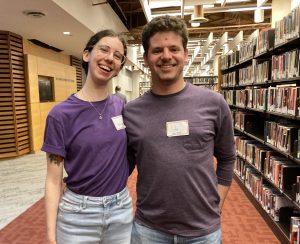 TORONTO — Mark Talesnick is holding up a wooden base with three wooden blocks attached to it at varying heights.
TORONTO — Mark Talesnick is holding up a wooden base with three wooden blocks attached to it at varying heights.
Engineer Mark Talesnick, centre, and two Technion students, Alaalden Samara, left, and Elad Katriel, are inside their “biogas digester” model, made of bamboo and sushi mats. The digester allows rural villagers in Nepal to cook and heat their houses in a sustainable way.
“Which one of these buildings would you want to be in during an earthquake?” he asks. The answer? The one that doesn’t fall down.
Talesnick is a University of Toronto geological engineering graduate, a senior lecturer in the faculty of civil and environmental engineering at Israel’s Technion Institute of Technology and a member of Engineers without Borders. He spoke Dec. 2 at Beth David Synagogue on “Engineering with Soul: Achievements of Israeli Engineers without Borders (EWB).”
Much of Talesnick’s talk focused on what he calls the “global engineer,” a new type of engineer for “the other 90 per cent” of the world’s population.
Engineering schools worldwide tend to emulate the teaching lessons of schools in North America, he said, which is a problem – because those engineers are mainly taught how to build “80-storey buildings and six-lane highways.
“[We are] trying to create a new type of engineer at Technion, and it’s working,” he said.
One such example of “engineering for the other 90 per cent” is a project Talesnick, along with some Technion students, undertook in Nepal in conjunction with EWB to come up with a sustainable way for residents in rural villages to cook and heat their houses.
Before Technion students got involved in the project, 90 per cent of the population cooked using wood, Talesnick said. This was problematic because it caused depletion of natural resources, and the smoke generated from using wood for cooking often led to respiratory disease.
Their solution was to build a “biogas digester” – which uses water and animal manure or human waste to bring power to buildings – for every house in Namsaling, a village in Nepal.
There were already 200,000 digesters in Nepal, but the building process was very time consuming. First a pit had to be filled with soil, then a dome was shaped over it and concrete was laid over the surface of the dome. After the concrete was laid, the soil under the dome had to be removed.
Returning to Israel, the students got to work on a way to make the process of building a biogas digester easier. Using aluminum and Styrofoam, they built a dome that reduced the time and effort required to build the digesters. However, aluminum and Styrofoam are not readily available in Nepal, so a model made with bamboo and sushi mats is now used to build the digesters.
The use of biogas digesters doesn’t result in deforestation, they provide cleaner energy, and there are no health-related problems with them. As well, the waste that comes out of the digesters can be used as fertilizer, Talesnick said.
His goal for this type of engineering, what he calls “engineering with soul” is to get three per cent of civil engineering students involved, he said.
“If we don’t change the way we teach engineering, the globe will collapse.”






